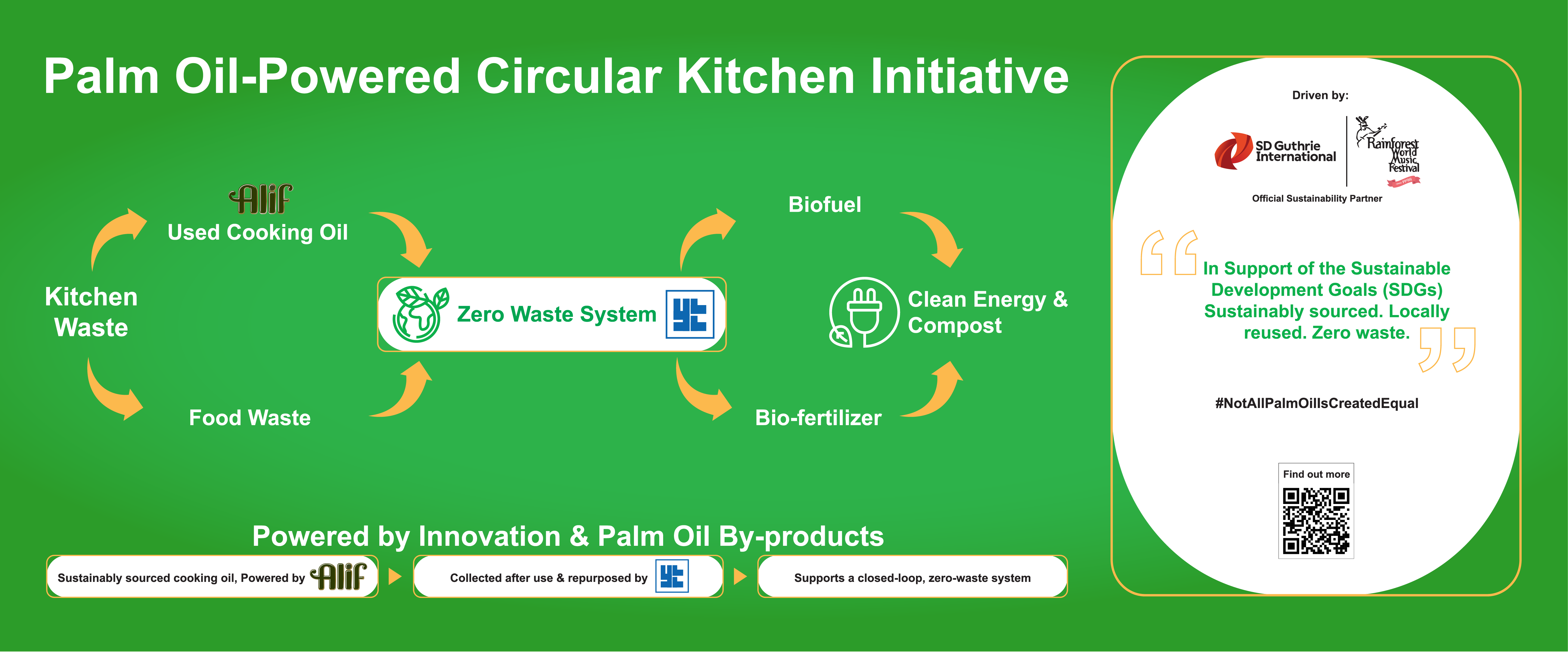

How SD Guthrie International brought circularity to the Rainforest World Music Festival through palm oil innovation
At SD Guthrie International (SDGI), we believe palm oil can contribute meaningfully to a sustainable future when grown, sourced and managed responsibly. For too long, the conversation around palm oil has focused only on its risks. But Not All Palm Oil Is Created Equal. At SDGI, we are committed to proving that sustainability and innovation can coexist within the palm oil industry.
At the Rainforest World Music Festival 2025 (RWMF), we turned that belief into action with the Palm Oil-Powered Circular Kitchen. This sustainability initiative was a real-world demonstration of how circular thinking can reframe palm oil as a driver of low-carbon solutions.
From Farm to Fryer — Then Beyond
During the three-day festival, SDGI supplied ALIF Cooking Oil to all food vendors. ALIF is produced through practices that meet rigourous sustainability standards. Once the oil was used for cooking, it was collected by our local partner, YLL Trading Sdn Bhd, and converted into biodiesel. This process demonstrates how a byproduct from food preparation could be transformed into clean energy, creating a local value chain that benefited both people and the environment.
The circular kitchen initiative reflects the core principles of a circular economy: minimising waste, maximising value, and building local partnerships for long-term impact.
Not All Palm Oil Is Created Equal
Palm oil has long been viewed through a narrow lens that focuses on deforestation and carbon emissions. While those concerns are valid and acknowledged, they do not reflect the full picture. The reality is that palm oil, when produced responsibly, is one of the most land-efficient and versatile crops available.
SDGI’s presence at RWMF aimed to shift the narrative. Our circular kitchen initiative gave festival-goers a firsthand look at responsible palm oil in action—sourced from transparent, certified plantations, used sustainably, and then given a second life as fuel.
This effort was about more than waste reduction. At RWMF 2025, we set out to “close the loop” - not just in waste, but in mindset. By showing how used palm oil can become clean energy, we challenged perceptions and demonstrated what sustainable palm oil can achieve when managed end-to-end.
Local Roots Driving Circular Change
Crucially, this system wasn’t dependent on distant infrastructure. The success of the initiative relied on cooperation with YLL Trading, a biodiesel company based in Sarawak. Their experience in recycling used cooking oil and converting it into biodiesel added technical depth to the project and ensured that all operations stayed within the local economy. Keeping the collection and conversion process regional helped reduce transport emissions and empowered local stakeholders.
This model proves that meaningful sustainability doesn’t always require high-tech solutions. Sometimes, it’s about reconnecting existing industries in smarter ways and doing so hand-in-hand with local partners who care about the outcomes.
A Festival Footprint That Went Further
The Palm Oil-Powered Circular Kitchen was a message that sustainable palm oil is not only possible, it’s already happening. And that circular economy models, even on small scales, can point the way to bigger transformations.
This initiative also aligned with the goals of RWMF, which is celebrated for its emphasis on nature, culture, and community. The festival’s audience was uniquely positioned to appreciate the environmental message and engage with it in a meaningful way.
As part of our wider #BeyondZero framework goals, SDGI will continue investing in innovations, empower communities, and advance the role of responsible palm oil in a more sustainable world.

#BeyondZero #NotAllPalmOilIsCreatedEqual #SustainablePalmOil #CircularEconomy #SDGI #Sarawak #RWMF #RWMF2025